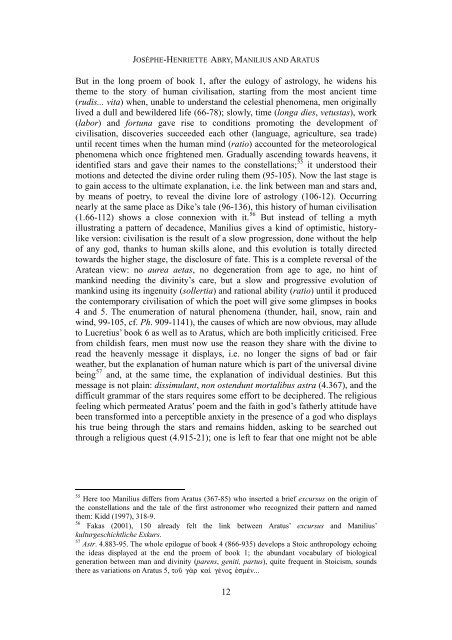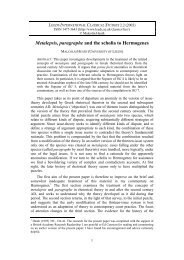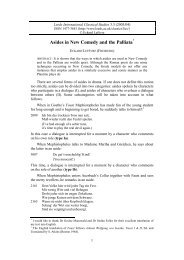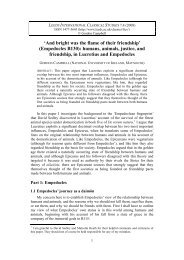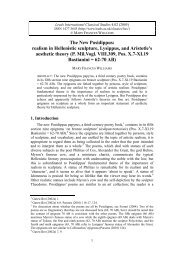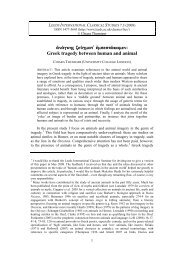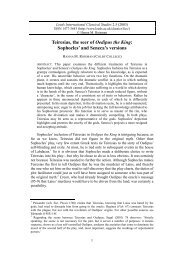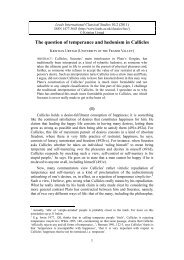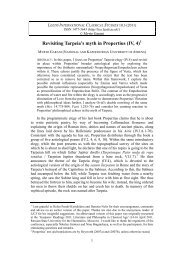Manilius and Aratus: two Stoic poets on stars - Leeds International ...
Manilius and Aratus: two Stoic poets on stars - Leeds International ...
Manilius and Aratus: two Stoic poets on stars - Leeds International ...
You also want an ePaper? Increase the reach of your titles
YUMPU automatically turns print PDFs into web optimized ePapers that Google loves.
JOSÈPHE-HENRIETTE ABRY, MANILIUS AND ARATUS<br />
But in the l<strong>on</strong>g proem of book 1, after the eulogy of astrology, he widens his<br />
theme to the story of human civilisati<strong>on</strong>, starting from the most ancient time<br />
(rudis... vita) when, unable to underst<str<strong>on</strong>g>and</str<strong>on</strong>g> the celestial phenomena, men originally<br />
lived a dull <str<strong>on</strong>g>and</str<strong>on</strong>g> bewildered life (66-78); slowly, time (l<strong>on</strong>ga dies, vetustas), work<br />
(labor) <str<strong>on</strong>g>and</str<strong>on</strong>g> fortuna gave rise to c<strong>on</strong>diti<strong>on</strong>s promoting the development of<br />
civilisati<strong>on</strong>, discoveries succeeded each other (language, agriculture, sea trade)<br />
until recent times when the human mind (ratio) accounted for the meteorological<br />
phenomena which <strong>on</strong>ce frightened men. Gradually ascending towards heavens, it<br />
identified <strong>stars</strong> <str<strong>on</strong>g>and</str<strong>on</strong>g> gave their names to the c<strong>on</strong>stellati<strong>on</strong>s; 55 it understood their<br />
moti<strong>on</strong>s <str<strong>on</strong>g>and</str<strong>on</strong>g> detected the divine order ruling them (95-105). Now the last stage is<br />
to gain access to the ultimate explanati<strong>on</strong>, i.e. the link between man <str<strong>on</strong>g>and</str<strong>on</strong>g> <strong>stars</strong> <str<strong>on</strong>g>and</str<strong>on</strong>g>,<br />
by means of poetry, to reveal the divine lore of astrology (106-12). Occurring<br />
nearly at the same place as Dike’s tale (96-136), this history of human civilisati<strong>on</strong><br />
(1.66-112) shows a close c<strong>on</strong>nexi<strong>on</strong> with it. 56 But instead of telling a myth<br />
illustrating a pattern of decadence, <str<strong>on</strong>g>Manilius</str<strong>on</strong>g> gives a kind of optimistic, historylike<br />
versi<strong>on</strong>: civilisati<strong>on</strong> is the result of a slow progressi<strong>on</strong>, d<strong>on</strong>e without the help<br />
of any god, thanks to human skills al<strong>on</strong>e, <str<strong>on</strong>g>and</str<strong>on</strong>g> this evoluti<strong>on</strong> is totally directed<br />
towards the higher stage, the disclosure of fate. This is a complete reversal of the<br />
Aratean view: no aurea aetas, no degenerati<strong>on</strong> from age to age, no hint of<br />
mankind needing the divinity’s care, but a slow <str<strong>on</strong>g>and</str<strong>on</strong>g> progressive evoluti<strong>on</strong> of<br />
mankind using its ingenuity (sollertia) <str<strong>on</strong>g>and</str<strong>on</strong>g> rati<strong>on</strong>al ability (ratio) until it produced<br />
the c<strong>on</strong>temporary civilisati<strong>on</strong> of which the poet will give some glimpses in books<br />
4 <str<strong>on</strong>g>and</str<strong>on</strong>g> 5. The enumerati<strong>on</strong> of natural phenomena (thunder, hail, snow, rain <str<strong>on</strong>g>and</str<strong>on</strong>g><br />
wind, 99-105, cf. Ph. 909-1141), the causes of which are now obvious, may allude<br />
to Lucretius’ book 6 as well as to <str<strong>on</strong>g>Aratus</str<strong>on</strong>g>, which are both implicitly criticised. Free<br />
from childish fears, men must now use the reas<strong>on</strong> they share with the divine to<br />
read the heavenly message it displays, i.e. no l<strong>on</strong>ger the signs of bad or fair<br />
weather, but the explanati<strong>on</strong> of human nature which is part of the universal divine<br />
being 57 <str<strong>on</strong>g>and</str<strong>on</strong>g>, at the same time, the explanati<strong>on</strong> of individual destinies. But this<br />
message is not plain: dissimulant, n<strong>on</strong> ostendunt mortalibus astra (4.367), <str<strong>on</strong>g>and</str<strong>on</strong>g> the<br />
difficult grammar of the <strong>stars</strong> requires some effort to be deciphered. The religious<br />
feeling which permeated <str<strong>on</strong>g>Aratus</str<strong>on</strong>g>’ poem <str<strong>on</strong>g>and</str<strong>on</strong>g> the faith in god’s fatherly attitude have<br />
been transformed into a perceptible anxiety in the presence of a god who displays<br />
his true being through the <strong>stars</strong> <str<strong>on</strong>g>and</str<strong>on</strong>g> remains hidden, asking to be searched out<br />
through a religious quest (4.915-21); <strong>on</strong>e is left to fear that <strong>on</strong>e might not be able<br />
55<br />
Here too <str<strong>on</strong>g>Manilius</str<strong>on</strong>g> differs from <str<strong>on</strong>g>Aratus</str<strong>on</strong>g> (367-85) who inserted a brief excursus <strong>on</strong> the origin of<br />
the c<strong>on</strong>stellati<strong>on</strong>s <str<strong>on</strong>g>and</str<strong>on</strong>g> the tale of the first astr<strong>on</strong>omer who recognized their pattern <str<strong>on</strong>g>and</str<strong>on</strong>g> named<br />
them: Kidd (1997), 318-9.<br />
56<br />
Fakas (2001), 150 already felt the link between <str<strong>on</strong>g>Aratus</str<strong>on</strong>g>’ excursus <str<strong>on</strong>g>and</str<strong>on</strong>g> <str<strong>on</strong>g>Manilius</str<strong>on</strong>g>’<br />
kulturgeschichtliche Exkurs.<br />
57<br />
Astr. 4.883-95. The whole epilogue of book 4 (866-935) develops a <str<strong>on</strong>g>Stoic</str<strong>on</strong>g> anthropology echoing<br />
the ideas displayed at the end the proem of book 1; the abundant vocabulary of biological<br />
generati<strong>on</strong> between man <str<strong>on</strong>g>and</str<strong>on</strong>g> divinity (parens, geniti, partus), quite frequent in <str<strong>on</strong>g>Stoic</str<strong>on</strong>g>ism, sounds<br />
there as variati<strong>on</strong>s <strong>on</strong> <str<strong>on</strong>g>Aratus</str<strong>on</strong>g> 5, toà g¦r kaˆ gšnoj smšn...<br />
12


